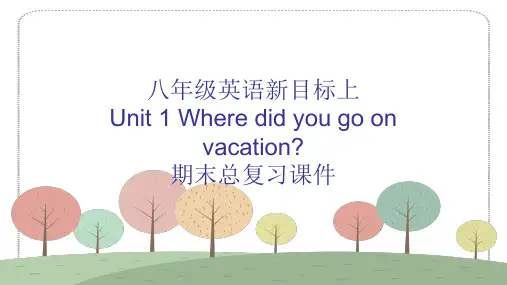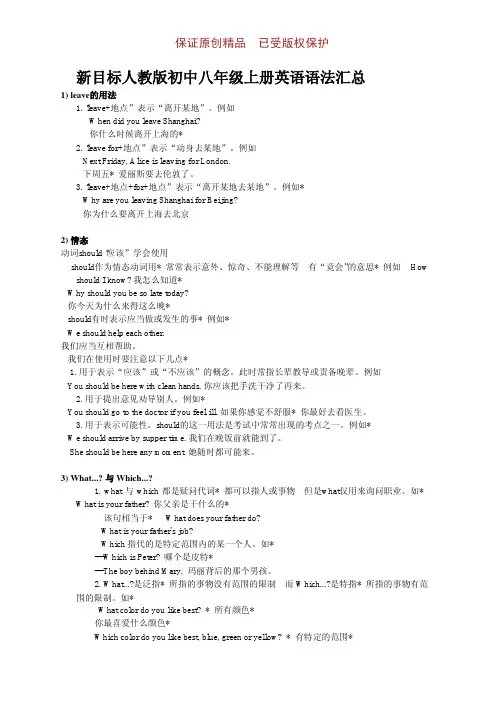人教版新目标八年级上册英语语法总结大全.ppt
- 格式:ppt
- 大小:429.06 KB
- 文档页数:127
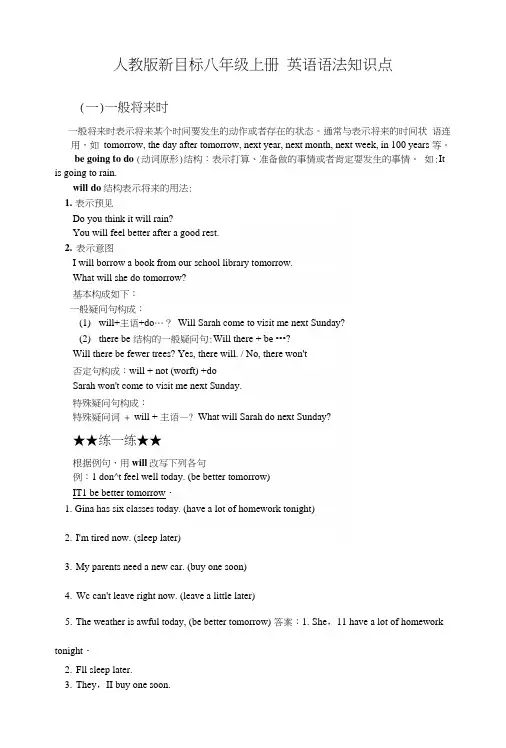
人教版新目标八年级上册英语语法知识点(一)一般将来时一般将来时表示将来某个时间要发生的动作或者存在的状态。
通常与表示将来的时间状语连用,如tomorrow, the day after tomorrow, next year, next month, next week, in 100 years 等。
be going to do (动词原形)结构:表示打算、准备做的事情或者肯定耍发生的事情。
如:It is going to rain.will do结构表示将来的用法:1.表示预见Do you think it will rain?You will feel better after a good rest.2.表示意图I will borrow a book from our school library tomorrow.What will she do tomorrow?基本构成如下:一般疑问句构成:(1)will+主语+do…?Will Sarah come to visit me next Sunday?(2)there be 结构的一般疑问句:Will there + be •••?Will there be fewer trees? Yes, there will. / No, there won't否定句构成:will + not (worft) +doSarah won't come to visit me next Sunday.特殊疑问句构成:特殊疑问词 + will + 主语—? What will Sarah do next Sunday?★★练一练★★根据例句,用will改写下列各句例:1 don^t feel well today. (be better tomorrow)IT1 be better tomorrow・1.Gina has six classes today. (have a lot of homework tonight)2.I'm tired now. (sleep later)3.My parents need a new car. (buy one soon)4.Wc can't leave right now. (leave a little later)5.The weather is awful today, (be better tomorrow) 答案:1. She,11 have a lot of homeworktonight・2.Fll sleep later.3.They,II buy one soon.4.We'll leave a little later.5.Maybe itTl be better tomorrow.(—)should 的用法:should川來捉出建议和忠告,后边加动词原形,否定句直接在should后边加not.例如:I think you should eat less junk food.我认为你应该少吃垃圾食晶。
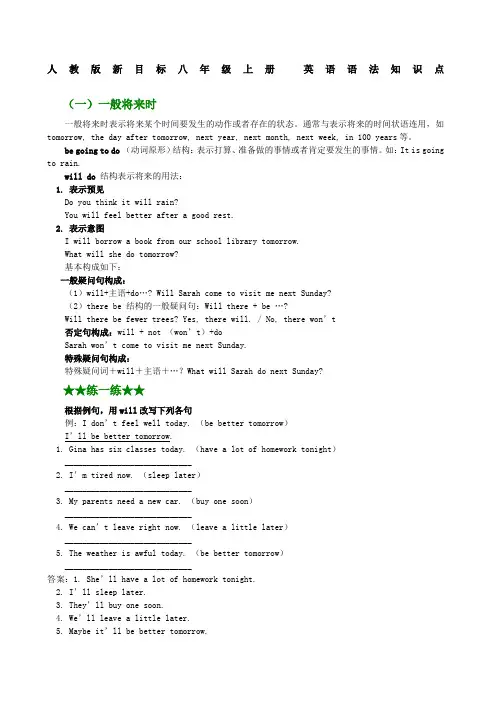
人教版新目标八年级上册英语语法知识点(一)一般将来时一般将来时表示将来某个时间要发生的动作或者存在的状态。
通常与表示将来的时间状语连用,如tomorrow, the day after tomorrow, next year, next month, next week, in 100 years等。
be going to do(动词原形)结构:表示打算、准备做的事情或者肯定要发生的事情。
如:It is going to rain.will do结构表示将来的用法:1. 表示预见Do you think it will rain?You will feel better after a good rest.2. 表示意图I will borrow a book from our school library tomorrow.What will she do tomorrow?基本构成如下:一般疑问句构成:(1)will+主语+do…? Will Sarah come to visit me next Sunday?(2)there be 结构的一般疑问句:Will there + be …?Will there be fewer trees? Yes, there will. / No, there won’t否定句构成:will + not (won’t)+doSarah won’t come to visit me next Sunday.特殊疑问句构成:特殊疑问词+will+主语+…?What will Sarah do next Sunday?★★练一练★★根据例句,用will改写下列各句例:I don’t feel well today. (be better tomorrow)I’ll be better tomorrow.1. Gina has six classes today. (have a lot of homework tonight)_____________________________2. I’m tired now. (sleep later)_____________________________3. My parents need a new car. (buy one soon)_____________________________4. We can’t leave right now. (leave a little later)_____________________________5. The weather is awful today. (be better tomorrow)_____________________________答案:1. She’ll have a lot of homework tonight.2. I’ll sleep later.3. They’ll buy one soon.4. We’ll leave a little later.5. Maybe it’ll be better tomorrow.(二)should的用法:should用来提出建议和忠告,后边加动词原形,否定句直接在should后边加not.例如:I think you should eat less junk food.我认为你应该少吃垃圾食品。

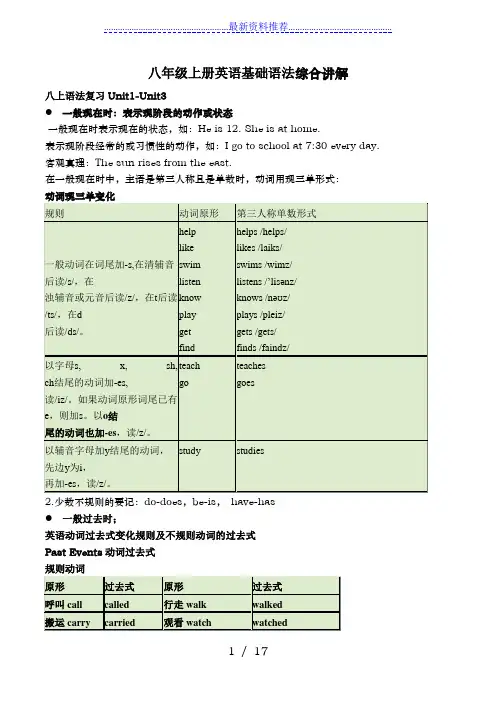
八年级上册英语基础语法综合讲解八上语法复习Unit1-Unit3●一般现在时:表示现阶段的动作或状态一般现在时表示现在的状态,如:He is 12. She is at home.表示现阶段经常的或习惯性的动作,如:I go to school at 7:30 every day. 客观真理:The sun rises from the east.在一般现在时中,主语是第三人称且是单数时,动词用现三单形式:2.少数不规则的要记:do-does,be-is,have-has●一般过去时;英语动词过去式变化规则及不规则动词的过去式Past Events动词过去式规则动词[1]直接加d或者ede结尾的动词, 直接加d: smile--smiled; hope--hoped.[2] 双辅音结尾的情况: 直接加ed: helped; learned.[3]重读闭音节:一个元音+一个辅音结尾的情况:双写最后一个辅音字母加ed. stopped; planned; preferred(重读在fer前); admitted(重读在mit前); referred; deferred;[4] y结尾的情况:辅音+y结尾动词,y变i加ed: worried;studied.●不定代词和不定副词的用法:回顾:some和any(一些)1) some一般用于肯定句,any用于否定句和疑问句①我需要一些笔记本。
②我没有书。
I don’t have ()books.③Do you have ( )books? 你有一些书吗?2) 在表示请求、建议、征求意见等委婉语气的疑问句中,用some而不用any。
Can you bring some things to school? 你能带些东西到学校吗?②Would you like ( ) apples? 你想要一些苹果吗?some bodyany oneevery thingno where(疑问副词)(1)左边的some、any、every、no与右边的body、one、thing构成不定代词,some、any、every、no与右边的疑问副词where构成不定副词;(2)一般情况下以some开头的不定代词和不定副词用于肯定句,以any开头的不定代词和不定副词用于否定句、疑问句;以no开头的不定代词和不定副词表示否定含义(no one为两个单词);(3)不定代词或不定副词和形容词连用时,形容词放在后面。
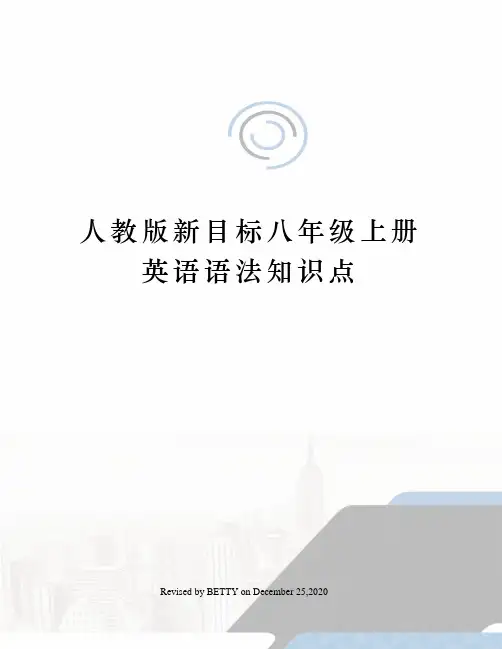
人教版新目标八年级上册英语语法知识点Revised by BETTY on December 25,2020人教版新目标八年级上册英语语法知识点(一)一般将来时一般将来时表示将来某个时间要发生的动作或者存在的状态。
通常与表示将来的时间状语连用,如tomorrow, the day after tomorrow, next year, next month, next week, in 100 years等。
be going to do(动词原形)结构:表示打算、准备做的事情或者肯定要发生的事情。
如:It is going to rain.will do结构表示将来的用法:1. 表示预见Do you think it will rainYou will feel better after a good rest.2. 表示意图I will borrow a book from our school library tomorrow.What will she do tomorrow基本构成如下:一般疑问句构成:(1)will+主语+do… Will Sarah come to visit me next Sunday(2)there be 结构的一般疑问句:Will there + be …Will there be fewer trees Yes, there will. / No, there won’t否定句构成:will + not (won’t)+doSarah won’t come to visit me next Sunday.特殊疑问句构成:特殊疑问词+will+主语+…What will Sarah do next Sunday★★练一练★★根据例句,用will改写下列各句例:I don’t feel well today. (be better tomorrow)I’ll be better tomorrow.1. Gina has six classes today. (have a lot of homework tonight)_____________________________2. I’m tired now. (sleep later)_____________________________3. My parents need a new car. (buy one soon)_____________________________4. We can’t leave right now. (leave a little later)_____________________________5. The weather is awful today. (be better tomorrow)_____________________________答案:1. She’ll have a lot of homework tonight.2. I’ll sleep later.3. They’ll buy one soon.4. We’ll leave a little later.5. Maybe it’ll be better tomorrow.(二)should的用法:should用来提出建议和忠告,后边加动词原形,否定句直接在should后边加not.例如:I think you should eat less junk food.我认为你应该少吃垃圾食品。
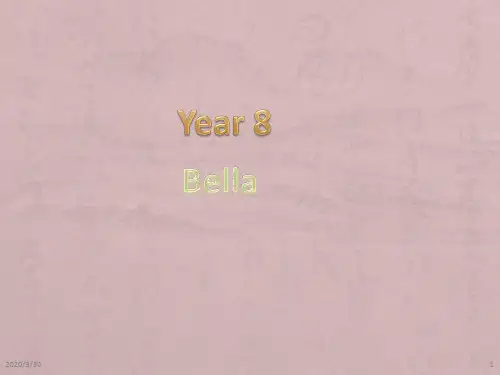
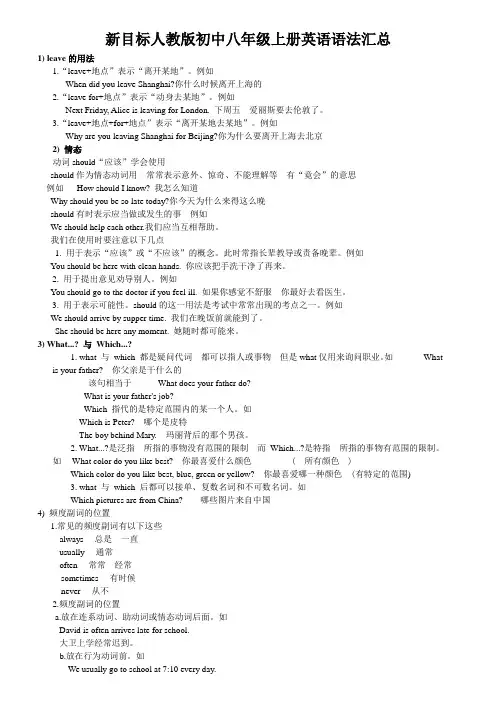
新目标人教版初中八年级上册英语语法汇总1) leave的用法1.“leave+地点”表示“离开某地”。
例如When did you leave Shanghai?你什么时候离开上海的2.“leave for+地点”表示“动身去某地”。
例如Next Friday, Alice is leaving for London. 下周五爱丽斯要去伦敦了。
3.“leave+地点+for+地点”表示“离开某地去某地”。
例如Why are you leaving Shanghai for Beijing?你为什么要离开上海去北京2) 情态动词should“应该”学会使用should作为情态动词用常常表示意外、惊奇、不能理解等有“竟会”的意思例如How should I know? 我怎么知道Why should you be so late today?你今天为什么来得这么晚should有时表示应当做或发生的事例如We should help each other.我们应当互相帮助。
我们在使用时要注意以下几点1. 用于表示“应该”或“不应该”的概念。
此时常指长辈教导或责备晚辈。
例如You should be here with clean hands. 你应该把手洗干净了再来。
2. 用于提出意见劝导别人。
例如You should go to the doctor if you feel ill. 如果你感觉不舒服你最好去看医生。
3. 用于表示可能性。
should的这一用法是考试中常常出现的考点之一。
例如We should arrive by supper time. 我们在晚饭前就能到了。
She should be here any moment. 她随时都可能来。
3) What...? 与Which...?1. what 与which 都是疑问代词都可以指人或事物但是what仅用来询问职业。
如Whatis your father? 你父亲是干什么的该句相当于What does your father do?What is your father's job?Which 指代的是特定范围内的某一个人。

